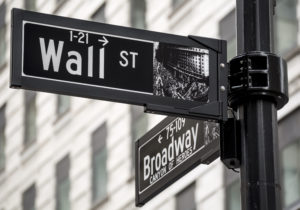Because I believe I should improve the world and finances of my friends, so I’m telling you all about my awesome investing strategy*:
A lot of people know what’s going on in the stock market. Me? I just don’t care, because it doesn’t matter. I mean, sure, I know things like “we’re in a rescission,” “we’re in a boom period,” and “Europe/China/Japan/Russia is doing great/terrible/having some civil unrest or other irrelevant event that’s making the Euro tank,” but most of that stuff only matters today.
I don’t invest for today. I invest for the long-term, like next week.
Many of you know that for the last several years, my investing strategy was pretty simple and static, “Buy the IPO of Tesla and hold it.”
As fun as it was watching the stock go up when Tesla has a great idea that it will do in 2025, it was also ridiculous watching the stock tank because Elon has a big mouth and bashed something not related to his industry, which just obviously makes the stock tank.
Either way, it was a good 1000% ROI. That story is done.
With all this cash from selling all of Tesla, I’m back to my “normal” investing strategy. It’s not so much normal or a strategy as it is a belief system and a set of concepts. Basically, the efficient market hypothesis, knowing that Wall Street is a spaz, the market is cyclical, and macro trends guide my investing. Let me explain:
Efficient Market Hypothesis
In short, the Efficient Market Hypothesis says that for all of the research you do, all of the things you “uncover” that is public information, is already known by Wall Street, and the stock price has already adjusted to reflect that information. Everything you learned about investing from college or that book doesn’t matter.
In Investopedia terms:
The efficient market hypothesis (EMH) is an investment theory that states it is impossible to “beat the market” because stock market efficiency causes existing share prices to always incorporate and reflect all relevant information.
http://www.investopedia.com/terms/e/efficientmarkethypothesis.asp
Obviously this is questionable as a big-wig investor will publish their opinion, and the market responds, at least in the short-term (the opinion, I guess, is new information).
That brings me to my second concept:
Wall Street Is a Spaz

Wall Street responds to everything, usually pessimistically. Sure, everyone thinks it would be great to make money, but no one wants to lose money. Ever.
Therefore, whenever there’s news that isn’t fully-awesome good, the market will go down, if even for a bit. As a conservative, yet optimistic, Midwestern investor, I know everything in the Big City is just smoke and mirrors, but the reality is that a company is working hard to, um, enhance the return for its stockholders. Really, they’re all just trying to make it, to get bigger, and to make our world a better place.
So when I invest, I’m above the influence of a little neutral news here and there. Because remember, if it’s not great news, it’s probably bad news…. right?
Not really, and that brings me to my third concept:
The Market is Cyclical
When a stock goes up, it will go down. When a stock is down on it’s luck, it’ll get back on track. Obviously, there are a lot of exceptions to this rule, but it is the general trend. Unless there’s a Macro Trend or some really bad company-specific news, stock prices rise and fall. If you can’t deal with it, buy muni-bonds backed by a T-note.
Considering Macro Trends is important, and also brings me to my fourth concept:
Macro Trends
Macro Trends is basically the concept that means, “don’t do anything stupid.”
For example, don’t buy Blockbuster stock just because it is super cheap.
While Macro Trends can easily be a reason for inaction, they can also be reason for action.
An example of this which is just the opposite. During The Great Recession, bank stocks were cheap. Well, obviously, a good investment wasn’t all those banks that were having problems. While it’s true, you would’ve had a 5 year return that was 100%, why would you want an investment with such a low and slow return?
I invested in a lot of small banks. Mostly ones in the Midwest or the Confederate South. I’m not sure why that geographic choice–that’s just where the companies were located. But they were all down. I figured everyone was hard on banks, but these little banks didn’t do anything mean, so I bought them.
Generally, if I buy a stock, once it hits 20% gain, I sell it.
Weren’t you reading earlier? The market is cyclical. It might go up more, but I have just found that it takes a lot longer to go significantly above 20% than it does to get there. It’s a random stock: get in, make your buck, get out.
Superior By the Numbers
So let’s suppose you buy a stock, hold it for a month, and sell it for 20% gain. That’s pretty cool, since annualized, your ROI is 240%. Yay!
I am a conservative Midwestern bloke, so I do invest in small lots to keep it diversified. And I wait until I find a reasonable stock.
There is still some risk. The risk isn’t that your company will go under, but the risk is that your stock won’t move and you’ll be stuck with an ROI of 0% for a while. You need to be patient and wait for the price to move, and sometimes this takes a while.
Why wouldn’t you sell? Because the price could move tomorrow.
The Best Part
 The best part of this investing strategy is that it’s incredibly low maintenance.
The best part of this investing strategy is that it’s incredibly low maintenance.
By telling you all about it, I’ve just spent more time than I do actually paying attention to my brokerage account in a month.
Check in the morning, sell your big gainers, check in the afternoon, see if you had any movements, possibly sell.
Boom – you’re done.
That’s my strategy. You’re welcome. Happy Friday!
*I am not a financial adviser and do not render financial advice
